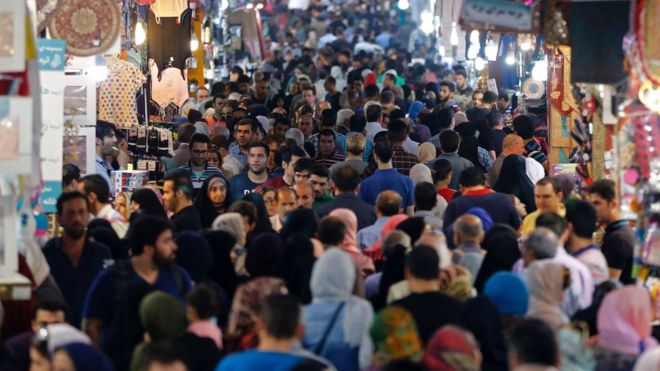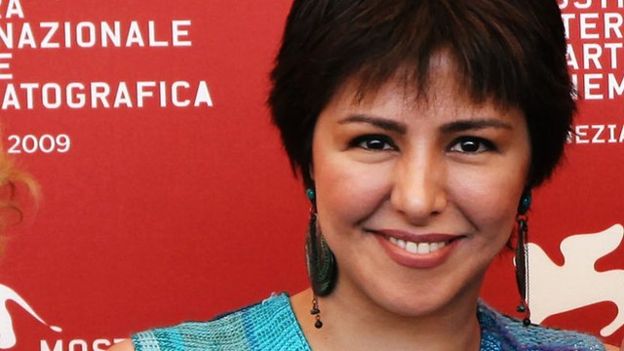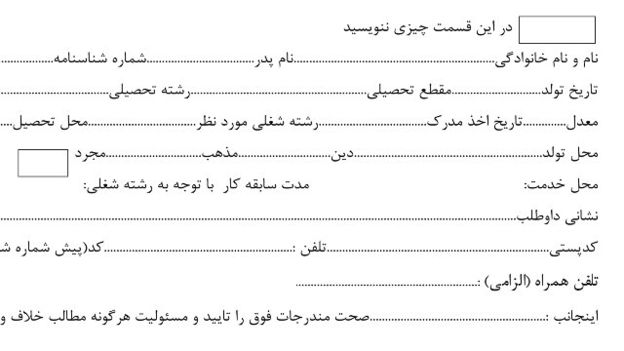Source: www.bbc.com
Translation by Iran Press Watch

The religion question on job application forms in Iran has become a major crisis for those citizens of the country whose religion is not recognized by the government.
According to Article 12 of the Constitution of Iran, the official religion of this country is the branch of Ja’fari, Twelver Shiism within Islam, while other Islamic branches, such as Hanafi, Shafei, Maleki, Hanbali, Zaidi “enjoy full respect, and followers of these religions are free to practice their religious ceremonies according to their religion.” Article 13 of the Constitution also recognizes Zoroastrians, Jews, and Christians as the only religious minorities who are free to practice their religious ceremonies within the confines of the law and act according to their own religious teachings in their personal affairs.
Believers of religions other than Twelver Shiite Muslims, who are recognized as the official religion in the Iranian constitution, also have many complaints about discrimination in employment and lack of full citizenship rights.
But Baha’is, as the largest religious minority in Iran which is not recognized in the constitution, have been formally deprived of the rights set forth in the constitution for religious minorities. They have no representatives in the Iranian parliament, and are deprived of the right to higher education and of employment in governmental institutions.
Baha’i citizens say that the root of their unresolvable problems, which deprives them of their social rights, is encountering the religion question on employment and other application forms.
Shabnam Toloui, a well-known Iranian artist, is one of those who, after answering the religion question on one such form, was deprived of her social rights, banned from work, and left with no option but to leave Iran. She says: “In Iran, whenever you want to be hired, or if you want to become a member of an association, etc., a file by security services will need to be opened for you, and in these forms the question immediately after first name and last name is about your religion. Such forms also exist in schools, universities, banks, and anywhere else that may offer you the slightest bit of official status. All of us, in one way or another, have come across such forms throughout our lives.”

Shabnam Toloui, an actor, director and playwright, is a resident of Paris. She played in the television series “No Comment”, which was broadcasted in Iran in 2002.
She says: “The security services of IRIB (Islamic Republic of Iran Broadcasting) sent me a form that included the religion question followed by questions regarding parents’ religions. I answered these questions truthfully because I understood this was a question from agents of the government. I neither was a teacher of the Faith nor had I done anything against the law, and I had no cases of ever acting against the morality laws as promulgated by the government. Everything was moving forward so smoothly that I thought to myself it was just a question, and I should answer it truthfully. This was the beginning of a huge headache. They objected and told me “You are a Baha’i, but just say that you are a Muslim, because you are famous, people know you and the situation is out of our hands.” I had been working in the theater for many years, and I had had a few awards. They said “you will set an example for people… The headaches started. I told them “I have no opposition to any religion. I come from a family that is half Shiite Muslims and the other half Sunni Muslims. I grew up in such an environment, but I am not a Muslim. I could not lie.” It was a very complicated situation and it dragged out for two years during which they harassed me in various ways and forms. When I was forbidden from all kinds of work and received a confidential letter, written by a government official who was a very honorable individual, that made me realize that my career in Iran had come to an end, I left Iran.”
According to him, “all those who work with IRIB have to fill out this form, and if they are not a Shiite Muslim, they should find a solution, either not tell the truth, or change their religion; otherwise they will be deprived of work. In other words, as soon as these people (Baha’is) are about to attain an official status, they immediately are faced with the ‘form’. They do the exact same thing for universities.”
Baha’i citizens in Iran are deprived of higher education after answering the “religion question”. Shabnam Toloui says: “For many years, we would fill the university form by answering Baha’i to the religion question, but when it was time to pick up our examination card, they would turn us down, and would tell us that “you are code 99, and therefore no examination card has been issued for you”. They would not even express the real reason, and this is how this discrimination was administered in a secret and shadowy way. Recently they have claimed that the reason for asking the religion question was not to interrogate people’s beliefs but to determine which religious questions to include in the examination to test their religious knowledge. Based on this, some Baha’i youth decided to write Islam, so they could answer the questions related to Islamic teachings, but after entering university they were expelled as soon as it was found out that they were Baha’is.”
This situation exists even though many articles of the Iranian Constitution consider the rights to education, employment, social security, retirement and other social rights to be “rights of all”, “every Iranian”, “everyone” and “all inclusive”, and there are no exceptions for religious minorities. Article 28 of the Constitution states: “Everyone has the right to choose a job which they desire as long as it is not against Islam or the public interest or the rights of others. Adhering to the needs of the community for various jobs, the government is to create opportunities for work at various professions, under equal conditions for all people.”
According to Article 29 of the Constitution, “Social security benefits in terms of retirement, unemployment, aging, disability, neglect, survival, accidents, the need for health services, healthcare and medical care in the form of insurance, etc., are universal rights.”
According to Article 23 of the Constitution, “Investigation of individuals’ beliefs is forbidden, and no one can be harassed because of their beliefs.”

But Shabnam Toloui says: “As soon as the revolution became a little settled and stable, they asked all government workers to fill out a form, and the religion question on these forms was key to the beginning of all ensuing problems. The moment anyone wrote down “Baha’i” they were expelled from work: even the retired were affected. My own grandfather, whose religion was not known even by his neighbors, was given this form when he went to the bank to collect his pension; he was told by the embarrassed bank teller that as of the next month his pension would be cut off.”
The only form in which the answer to the question of religion has not created a problem for Iranian Baha’is is the passport application form. According to Ms. Toloui, “Baha’is were not granted a passport before Mohammad Khatami’s presidency, as the same forms were used in the passport office. In response to an application they would send Baha’is to the Stone Building on Jordan Street (now Nelson Mandela Boulevard), where they were told “you should either write ‘Muslim’ or change your religion if you want to leave Iran.” However, after Mr. Khatami was elected President, although these forms were still in use, when people wrote ‘Baha’i’ they would initially be given a single use passport, allowing them to leave the country a single time; after they left and returned to Iran once, they would then be issued their permanent passport ‒ as if a political decision had been made to ‘give them their passports and let them go.’ This was the only place where an answer of ‘Baha’i’ to the religion question did not bring forth harassment ‒ they would give us a passport and say ‘leave’. A kind of silent exile.”
The Iranian government regards the Baha’i Faith as a “deviant sect”, and the Islamic Republic’s religious and political authorities consider personal contact with Baha’is, even so much as a hand shake, to be an abomination.
Ayatollah Ali Khamenei, the Iranian leader, made a statement that “all followers of the misguided sect of Baha’i are condemned to ‘najes’ (Shiite Islamic Term for ‘unclean’ or untouchable); when they touch anything, the religious process of purification must be observed. However, the behavior of administrators, teachers and educators with students should be based on legal and Islamic ethical principles.”
Leave a Reply